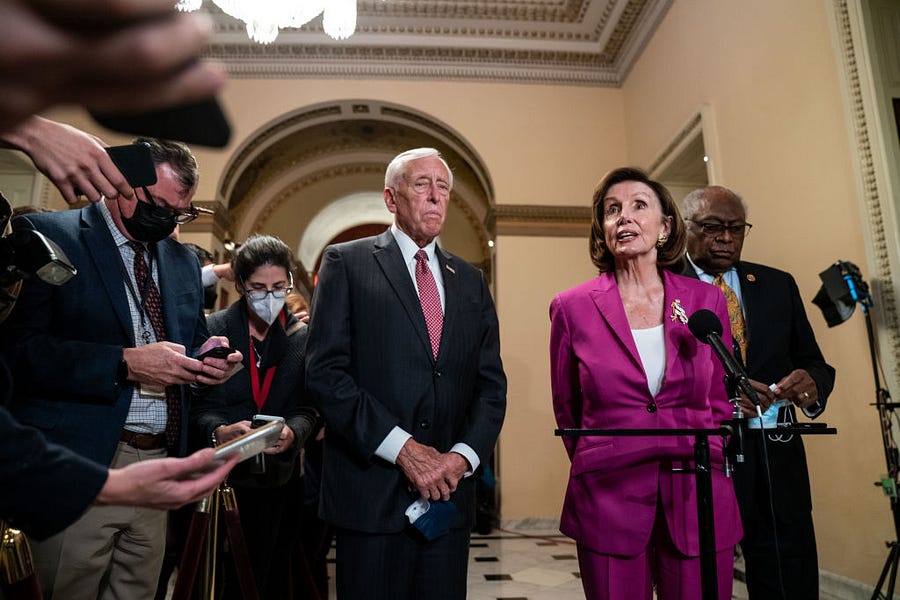Good afternoon and welcome to the final week that infrastructure memes will be allowed.
Team Uphill is anticipating a busy sprint to the end of the year between Democrats wrangling over the rest of President Joe Biden’s legislative agenda and next month’s debt ceiling deadline. In the meantime, inflation has hit Capitol complex restaurants, making it much more likely that we will be packing our own lunches for work. If you have any suggested go-to recipes, let us know in the comments.
The House passed a $1.2 trillion bipartisan infrastructure package last week with a vote of 228-206. Most Democrats voted for the bill, alongside 13 Republicans. Six progressive Democrats opposed it. (A full breakdown of the tally is available here.) The legislation passed the Senate over the summer but stalled in the House, where progressives withheld their support as leverage in an effort to advance their priorities in the larger Build Back Better reconciliation bill.
On Friday we brought you a detailed look at the climate provisions in Build Back Better. We thought we’d take a break from that today to look at some of the details of the bipartisan infrastructure bill now that it has passed. We’ll continue with another edition on the details of Build Back Better on Friday.
Here’s a non-exhaustive, but still fairly detailed, look at what the bill includes. You can read more in this helpful summary obtained earlier this year by Politico.
Cost: The overall price tag of the bill is about $1.2 trillion over the next eight years. About $550 billion is new appropriations over the next five years, over previously anticipated spending for reauthorizations and existing programs. About $205 billion of the bill is financed by repurposing unspent COVID-19 relief dollars. Other pay-fors include recouping fraudulent and unused unemployment insurance payments, increasing the reporting of cryptocurrency transactions to the IRS, and extending mortgage guarantee fees on government sponsored enterprise (GSEs). In 2011, Congress increased the cost of the fees that GSEs such as Fannie Mae and Freddie Mac charge to guarantee mortgages. That hike was set to expire in 2021 but the legislation extends the expiration date to 2032. Another pay-for is an estimated $56 billion in economic growth due to a 33 percent return on investment from the infrastructure projects themselves.
According to the nonpartisan Congressional Budget Office, the bill would add about $256 billion to the deficit over the next 10 years.
Roads and bridges: The legislation directs $110 billion to roads, bridges, and other related projects. This section is a mix of authorizing new spending and reauthorizing previously approved projects. The legislation reauthorizes the nation’s surface transportation program, which was set to expire in December, for the next five years. The bill also sets aside money for transportation research at colleges and universities, as well as money aimed at relieving congestion in cities.
Around $36 billion will go toward repairing and replacing bridges. A White House summary of the legislation claims that “one in five miles, or 173,000 total miles, of our highways and major roads and 45,000 bridges are in poor condition.”
The bill also spends $1 billion on reconnecting communities that were split by past infrastructure projects, such as highways that disrupted neighborhoods.
Railroads: The bill gives $66 billion in new spending toward the U.S. passenger rail system for upgrades, maintenance, and safety efforts. The bill also gives $6.5 billion toward Amtrak’s Northeast Corridor specifically, which stretches from Washington, D.C., to Boston and receives heavy usage. The bill also provides $16 billion for the Amtrak National Network overall to modernize stations and upgrade crossings, fencing, and technology to prevent collisions and increase safety.
Public transit: The bill sets aside $39 billion to repair and modernize the accessibility of the nation’s public transportation infrastructure. It also includes $4.75 billion for maintenance, replacement, and repairs of public transit buses and railways that are in poor condition.
Airports and waterways: The bill includes $25 billion for repairing the nation’s airports and efforts to reduce emissions. It also invests $17 billion in waterways and port infrastructure.
Electric vehicles: The bill includes $5 billion for increasing the number of electric vehicle charging stations across the nation. An additional $2.5 billion can be used to fund “alternative fueling infrastructure,” and $5 billion more will go to replacing older, emissions-heavy school buses with more energy efficient options, such as electric school buses.
Road safety: The bill invests $11 billion in transportation safety programming. One of these projects is a $5 billion “Safe Streets for All” program that works to reduce driving-related crashes and fatalities that affect cyclists and pedestrians.
Power infrastructure: The legislation includes $65 billion for upgrading power grids that are outdated and inefficient. The funds will also support building thousands of miles of new power lines for renewable energy. The bill spends $3.5 billion on upgrading low-income housing to be more energy efficient.
Broadband: The bill invests $65 billion in making high-speed internet more accessible for Americans, particularly in rural areas and others where households do not have easy access to broadband internet. The plan also sends $2 billion toward tribal grants to make it easier for Native Americans, Alaska Natives, and Native Hawaiians to access broadband.
Water infrastructure: $55 billion goes to ensuring clean drinking water for Americans. The legislation includes funding for replacing all the nation’s lead pipes and removing toxic chemicals from water service lines. Some experts and Democratic lawmakers have questioned whether this funding is enough to address the lead pipes, estimating the amount needed is much higher.
Resilience: The bill authorizes $50 billion to protect the electric grid against extreme weather and climate concerns such as wildfires, floods, and other natural disasters. The bill also authorizes funds for cybersecurity research and development programs.
Climate provisions: The bill gives $11.6 billion to The Army Corps of Engineers for flood control projects, $3.5 billion for flood mitigation and assistance to The Federal Emergency Management Administration (FEMA), and $140 million to the National Oceanic and Atmospheric Administration to forecast climate change and track inland and coastal flooding.
$100 million is included for the Bureau of Indian Affairs to relocate Indigenous communities that are at risk of climate concerns like sea-level rise.
More than $8.5 billion goes toward constructing infrastructure to capture and bury carbon dioxide emissions. The bill also sets aside money for dealing with abandoned oil and gas infrastructure: $4.7 billion will clean up and plug wells no longer utilized by the oil and gas industry.
House Democrats also approved a procedural step to consider the larger climate and social spending legislation in the near future. Moderate Democrats prevented a vote on passage of Build Back Better the same day as the bipartisan infrastructure package because they wanted to see a score on its budgetary effects from the Congressional Budget Office first.
The chamber is expected to take up the measure next week when members return from recess. House Speaker Nancy Pelosi reiterated that timing is still expected in a letter over the weekend, writing that “we must do more to address the climate crisis, promote equity and ensure that everyone has the opportunity to work.”
Some conservative commentators have slammed GOP Leader Kevin McCarthy for not doing more to prevent the 13 Republicans who supported it from voting yes. The argument goes that having cleared an item of Biden’s agenda, Democrats are free to pursue the rest of their priorities.
But other traditionally conservative organizations, such as the U.S. Chamber of Commerce—along with the 19 Republican senators who voted for it over the summer—have a different theory. They believe progressives now have less power to push moderate Democratic Sens. Joe Manchin and Kyrsten Sinema to embrace their priorities in the upcoming reconciliation bill.
“I weakened their hand. They have no leverage now,” New York Rep. Nicole Malliotakis told Axios after the vote. “I voted against AOC and the squad tonight.”
Ocasio-Cortez tweeted over the weekend that if Build Back Better is gutted or dies, “we may have just locked in US emissions & thrown away our biggest chance to combat climate change.” She added that the stakes for passing the Democratic-only reconciliation bill are now higher.
With a slim majority in the House and a 50-50 Senate, Democratic leaders cannot afford to lose support from their members. Assuming all Republicans oppose the sweeping legislation, any three Democrats will have the power to derail it in the House, and any one Democratic senator will be able to block it from passing.
On the Floor
Nothing. Both chambers of Congress are out this week.
Key Hearings
The House Financial Services subcommittee on diversity and inclusion will hold a hearing today at noon on eliminating barriers for inclusion of the LGBTQ community. Information and livestream here
The House select panel on the coronavirus crisis will hold a hearing in Chicago Wednesday on building vaccine confidence. Information and livestream here.
Members of a House Agriculture subcommittee will meet Wednesday at noon for a hearing on hunger among veterans and servicemembers. Information and livestream here.









Please note that we at The Dispatch hold ourselves, our work, and our commenters to a higher standard than other places on the internet. We welcome comments that foster genuine debate or discussion—including comments critical of us or our work—but responses that include ad hominem attacks on fellow Dispatch members or are intended to stoke fear and anger may be moderated.
You are currently using a limited time guest pass and do not have access to commenting. Consider subscribing to join the conversation.
With your membership, you only have the ability to comment on The Morning Dispatch articles. Consider upgrading to join the conversation everywhere.